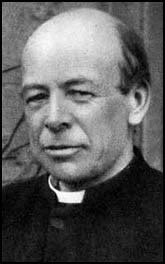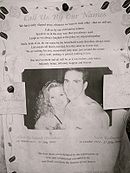Henry Scott Holland
Henry Scott Holland (born January 27, 1847 , † March 17, 1918 ) was Regius Professor of Divinity at Oxford University . He taught philosophy and religion and published numerous papers on these topics. Holland was canon of Christ Church Cathedral .
Life
Henry Scott Holland was born in Ledbury, a town in Herefordshire , England. He received his education and training at Eton , where he was a student of William Johnson Cory, and at the University of Oxford. Holland earned the Oxford degrees Doctor of Divinity (Divinitatis Doctor), Master of Arts ( Magister Artium ) and received an honorary doctorate as Doctor of Letters (Litterarum doctor).
Upon graduation, he was selected as a tutor for Christ Church (Oxford). In 1884 Holland temporarily left Oxford University and was appointed canon at St Paul's Cathedral .
Holland's particular interest was in the field of social justice. He established and formed the group around the term PESEK (politics, economy, socialism, ethics, Christianity), which in its definition and the final context stated that capitalist exploitation - but also the "powerlessness" of the proletariat - for the contemporary urban Be responsible for poverty.
In 1889, Holland founded the Christian Social Union , an organization within the Church of England . In 1910 he was appointed Regius Professor of Divinity (one of the oldest and most prestigious professorships in Oxford and Cambridge). Holland held this office until his death in 1918.
Death Is Nothing At All
On May 15, 1910, Henry Scott Holland, then canon of Saint Paul's Cathedral in London, preached a sermon on the occasion of the death of King Edward VII . In the sermon entitled “The King of Terrors”, Holland examines the natural but seemingly contradicting answers to death, the “King of Terror”: the fear of the inexplicable and the belief in the continuation of existence. The most famous quote from him today comes from dealing with the latter, which is usually given in abbreviated form:
| "Death is nothing at all. I have only slipped away into the next room. |
| Death doesn't mean anything. I just disappeared next door. |
Works
- Henry Scott Holland: Death Is Nothing At All ; London, Souvenir Press 1987; ISBN 0-285-62824-0 .
- Henry Scott Holland: Death means nothing ; Munich, Knaur 2006; ISBN 3-426-66589-1 .
Individual evidence
- ↑ Notice in the London Gazette on February 3, 1911, about the appointment of Henry Scott Holland as Regius Professor of Divinity at the University of Oxford.
- ↑ Notice in the London Gazette of the appointment of Arthur Cayley Headlam as Regius Professor of Divinity at the University of Oxford in the London Gazette on July 2, 1918.
- ↑ Hieron-Horridge on www.British-History.ac.uk; accessed on June 1, 2016.
- ↑ Complete text at http://en.wikisource.org/wiki/The_King_of_Terrors
- ^ From "Death Is Nothing At All", Canon Henry Scott Holland; Paul Saunders (illustrations); Souvenir Press Ltd (1987)
Web links
- Literature by and about Henry Scott Holland in the catalog of the German National Library
- CV (English)
- Poetic Expressions - long version
- Full text of the sermon on the death of King Edward VII
| personal data | |
|---|---|
| SURNAME | Holland, Henry Scott |
| BRIEF DESCRIPTION | English theologian, Regius Professor of Divinity at Oxford University |
| DATE OF BIRTH | January 27, 1847 |
| DATE OF DEATH | March 17, 1918 |

